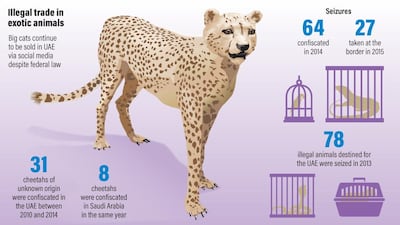Cheetah cubs continue to be sold on the UAE black market via social media accounts operated by five key dealers, helping fuel a thriving trade in illegal exotic pets.
Although the number of illegal cats seized at UAE borders is decreasing, experts working on the boundaries of the underground trade claim little has changed since a federal law regulating the possession, sale and breeding of dangerous animals came into force in January.
Cheetahs are regularly spotted for sale via popular online forums, with Instagram and Facebook key points of sale for illegal breeders.
Conservationists have been monitoring the activity of animals for sale in the UAE and wider Gulf region, and say trade continues to thrive.
“In the UAE, we have recorded about 50 social media accounts trading animals, but five seem to be major dealers in the UAE,” said Patricia Tricorache, of the International Cheetah Conservation Fund.
“Our data includes an average of 250 cheetahs per year offered for sale on the internet.
“Many Instagram accounts show people owning or selling exotic pets like chimps, gibbons, orangutans and even bears and leopards, an astounding amount of animals.”
A Convention on International Trade of Endangered Species (CITES) document reported 31 cheetahs of unknown origin confiscated in the UAE between 2010 and 2014, while Saudi Arabia reported eight confiscated cheetahs during the same period.
Although the biodiversity department of the Ministry of Climate Change and Environment did not have the numbers of confiscated animals for 2016 and 2017, it did say numbers had decreased.
In 2013, 78 illegal animals destined for the UAE were seized, with 64 confiscated in 2014 and just 27 taken at the border in 2015.
Ms Tricorache said the illegal nature of prohibited wildlife trade makes it difficult to collect data.
CCF figures are estimates based on data collected via every possible source, such as official or direct reports, as well as online advertising of animals for sale in the UAE and other Gulf states.
“The information I have is related to confiscations, as well as owners and dealers of exotic pets, including several in the UAE,” she said.
“We have compiled this information to try to come up with an estimate of illegally traded cheetahs but since this is not something most people openly talk about, the actual numbers could be much higher.
“We estimate about 300 cheetahs are smuggled out of northern Somalia every year.
“We have spoken to villagers involved in the trade in our investigations and they have told us at the height of the market they were smuggling about 100 a month, most destined for the Middle East.
“It is a conservative estimate about what is happening, and alarming considering the wild cheetah population in that region is already facing very low numbers.”
In 2014, Sharjah issued a ban on owning dangerous predators in residential areas, allowing only public and private zoos, scientific research centres and universities to keep them, and only after obtaining the required licence. Penalties range from Dh10,000 to Dh700,000.
________________________
Read more:
Cut out the middle man in exotic animal trade to kill market, expert says
Sanctuaries in Africa offer to take exotic pets from UAE following amnesty
Dubai Safari Park to include sanctuary for rescued exotic animals
Calls for crackdown as dangerous animals sold on UAE instagram accounts
________________________
Mona Omran Majed Al Shamsi, acting director of the biodiversity department at the ministry, said her team was working to help stop trafficking into the UAE.
“The frequency of confiscations depends on the detection of the smuggled shipments,” she said.
“It’s important to note the UAE has the highest detection records in the region, which is reflected in the number of confiscations made at borders.
“The geographical location of the UAE makes it a critical hub, as many shipments pass through via air, sea and land ports, thus the UAE has recognised the issue and has enacted a number of legislations.”
Ms Omran said the UAE is working hand-in-hand with the private sector to implement CITES regulation and conserve endangered species through different initiatives focusing on building awareness and developing different innovative tools to combat illegal wildlife trade.
Partnerships have been developed with Emirates airline, Etihad Airways, Dubai Ports World and Customs World, among others.
The ministry said it had drastically reduced the electronic illegal trade of endangered animal and plant species listed in the convention of illegal trade, in coordination with local authorities such as Telecommunications Regulatory Authority.
Joint efforts include tracking advertisements for the sale of endangered animals online.
“Most of these ads were posted by fake communication channels outside the state, and as a result, 60 per cent of such sites were removed, that’s about 800,” said Ms Omran.
“The external audit department in the ministry in coordination with the local environmental authorities conduct many inspection programmes on pet shops and the related businesses, and take appropriate action against the violator of CITES legalisations.”
For live CITES species confiscated, there are three options after confiscation as agreed on by the international community.
Authorities can return the animal to the country of export, with communications with the exporting country to ensure the species will be saved upon return to its natural habitat.
Option two is to take the live animal to a rescue centre or public or private zoo within or outside the country. The last resort is to euthanise, as per international standards.



